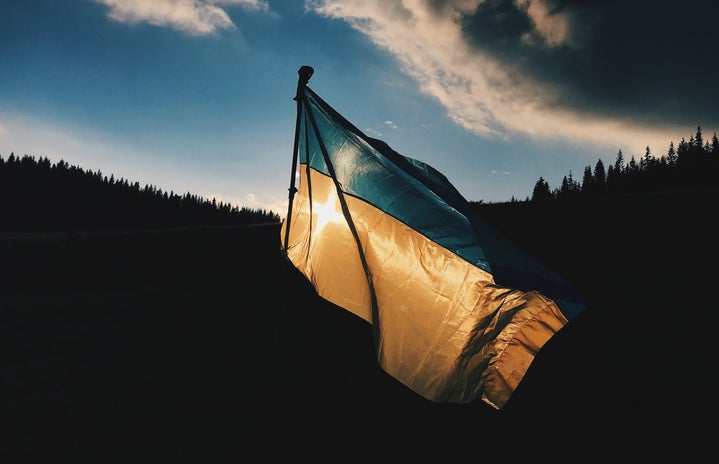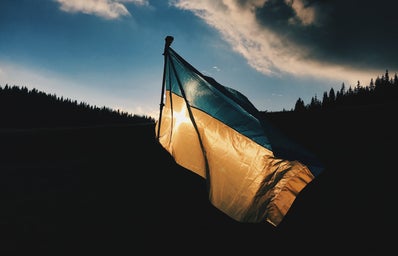Kyiv had gone through numerous blackouts during the week I was conducting this article, and as I’m staring at my computer screen, I’m crossing my fingers in hopes that S. will be able to join the call. She does and I ask her to tell me her story.
“When the full-scale invasion started I was in my third year at university and my second semester had just begun recently. One shouldn’t forget that the war in Ukraine has been going on since 2014. Russia annexed the Crimean peninsula and eastern Ukrainian territories, but on the 24th of February 2022, they attacked Ukraine at 4:30 in the morning and fired missiles into all of our major cities. The majority of us, especially those who live in the west or central Ukraine have experienced war for the first time that morning, and I wouldn’t wish a similar experience upon my worst enemy.”
I nod in agreement recalling the terrifying and heartbreaking memories of Thursday the 24th. I returned home to Kyiv on the 19th of February for reading week (the rumours of potential war were already hanging in the air). I remember only replying to the concerned emails from my tutors a week after the invasion began. I couldn’t study. I was sitting in a freezing house shuddering at every deafening sound of explosions, miles away from St Andrews. S. however, was supposed to have classes that day, so I ask her about her experience.
“On the 24th, it was a Thursday, obviously classes were cancelled. We all had a single task – survival. Wartime “semester break” was set in place until the 1st of April, however, my university decided to renew studies from the 17th of March. I’ll put it this way, studying in those conditions was hard. Extremely hard. Lectures were mostly prerecorded and posted online, but several tutors chose to host them live online. It was further complicated by the fact that my lectures were held in the second part of the day from 15:20 to 21:10 and precisely at that time the bombings increased, curfew began (during which it was prohibited to turn the lights on) and of course, you had to go down into the bomb shelters where the internet was extremely slow. And those are only the physical factors that I mentioned so far, but it was way harder to deal with the psychological ones. When you are under severe stress 24/7, worried about your loved ones, don’t get enough sleep, are ready to run to the shelter at any moment, wince at every sound and are constantly monitoring the news, it is quite hard to concentrate and force yourself to sit down and start doing any academic work. All with the knowledge that a missile can hit your house at any moment and you’ll simply die. The first two months were the hardest. After that you sort of realise that you don’t have a choice and this is now a reality which you have to accept.”
– What is it like at the moment?
“We are still studying online, but my university has decided to shorten the semester dates so that we finish earlier because the campus buildings can be given to the military or volunteers. So now we are studying 6 days per week with 4 seminars per day. Until the 10th of October 2022, we didn’t stop the lectures even during air raid alarms, but of course, Monday the 10th of October changed everything. Russia began firing numerous missiles at Kyiv and this became the most severe attack since spring. At the time of the attack, during one of my tutors’ lectures, the explosion wave blew out the windows in her classroom. After this, the university instructed everyone to stop any lectures or seminars during air raids. Also, the Russians are now intentionally destroying Ukraine’s critical infrastructure, therefore, we have extreme electricity cuts that can last up to 8 hours per day making it almost impossible to complete or upload any work. That’s not to mention charging devices, boiling the kettle, turning the radiators on and just generally doing all of the stuff which requires electricity.”
“We are all trying to uphold the illusion of normality, however, when there is a power cut, an air raid siren, or both at the same time, it is pretty hard to focus on any academic work. Impossible to be honest. Of course, I could use mobile internet, but firstly it’s so hard to concentrate on homework and deadlines when you are sitting in the dark and cold (as mentioned above, I study during the second part of the day and during the winter it gets dark early). Secondly, right now mobile internet doesn’t work well in Kyiv. Meaning that even if you do want to study or you urgently have to submit a deadline you’re unable to do so.
“Right now I am writing my dissertation, I have three deadlines approaching, I also have to teach at a school as part of my university coursework and I am practically unable to do this. It becomes harder and harder, with each blackout, with each air raid siren when you have to put your life on pause. All of the students are physically unable to complete everything in time. But despite everything we stay strong and believe in a better future.”


